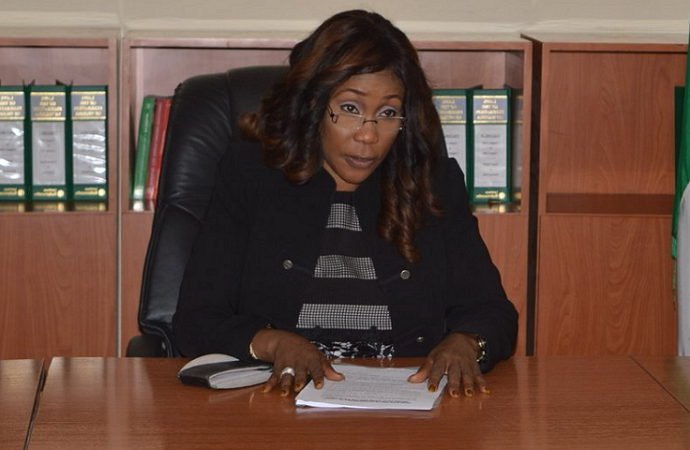The Director-General of the National Agency for the Prohibition of Trafficking in Persons, Julie Okah-Donli, on Friday reiterated the agency’s resolve to partner with witch doctors (also known as Juju Priests) in the fight against human trafficking.
Responding to questions during a meeting with Social Media Influencers in Lagos, Mrs. Okah-Donli said the witch doctors had been unaware of the effects of their practice and had revoked all the curses they laid on the trafficked girls.
“The juju priests have a job to do, they are doing their jobs they are making their money,” Mrs. Okah-Donli said while reacting to a question by PREMIUM TIMES.
“NAPTIP has been able to sensitise them, we’ve had meetings with all of the juju priests, they said they did not even know, they are now ambassadors for NAPTIP because now they report cases to us.”
During a symposium for NAPTIP officials in Abuja on Monday, Mrs. Okah-Donli reportedly said the agency had engaged the services of witch doctors in Benin, Edo State, to curb trafficking in persons.
“When we gathered these witch doctors recently to sensitise them on what human trafficking victims go through in Europe they were shocked,” the Punch newspaper quoted the NAPTIP boss as saying.
“And they have made their commitments to work with us to fight the menace of human trafficking.”
However, in a statement sent to PREMIUM TIMES on Tuesday, NAPTIP said the agency had not hired or employed witch doctors in the fight against human trafficking.
“What the Director-General said was that as part of the agency’s efforts to improve prosecution of trafficking cases in Nigeria, the agency is engaging all strata of society to understand their roles in the fight against human trafficking,” read the statement issued by Josiah Emerole, Head, Press and Public Relations, NAPTIP.

“Bearing in mind that the use of voodoo and administration of oaths on victims is one of the control mechanisms used by human traffickers on their victims, which makes it difficult for victims to open up and assist the agency in investigation, NAPTIP took its sensitisation campaign to Ayelara Shrines, in Edo State, where these oaths of secrecy are administered.
“The priests in those shrines were made to understand the implication of the oaths they administer on the victims and most of them have pledged not to work with the human traffickers any longer and have gone as far as assisting the victims renounce the oaths.”
On Friday, the Devatop Centre for Africa Development, a nonprofit organisation with focus on combating human trafficking, called for the prosecution of native doctors involved in human trafficking.
But Mrs. Okah-Donli said the juju priests told the agency that they had no idea what was going on with girls brought to them for oath-taking.
“All they knew was that the women will bring them that they want to give these girls jobs and they need to swear an oath so they don’t run with our money, so that was the impression that they were given.
“In fact, when we told them they were shocked and then they revoked the curses on all of these girls and said going forward if any madam comes to them they will report to NAPTIP and they will not administer oath on the girl.
“So right now, they are ambassadors for NAPTIP and they are cooperating with us so we cannot arrest them, we need information from them.”
The NAPTIP boss disagreed with claims that poverty and unemployment were the major causes of human trafficking in Nigeria.
“Most of these people who are trafficked don’t go for free. They pay as much as N500,000 to N1 million to be trafficked, so I think it’s more of stupidity and ignorance on their part,” she said.
“How poor can you be if you can afford N500,000 to N1 million? Give N500,000 and I will show you what I can do with it here in Nigeria, I don’t need to be a slave in anybody’s country. So it’s not an excuse.

“That is not to say that we do not expect the federal government to provide jobs for its people. But the truth is this, not every one of us can work in offices, there’s a lot you can do for yourselves, there are so many opportunities the federal government has come up with, there are soft loans, YouWin and all that.”
On NAPTIP’s fight to combat child marriages, Mrs. Okah-Donli said the agency had already begun the prosecution of some of the offenders.
“On child marriages, we’ve been able to rescue about two girls,” she said.
“NAPTIP is no respecter of persons when it comes to doing our job, I can assure you, I can tell you that much. We’ve been able to rescue two girls, young girls who were forcefully married because as far as I’m concerned, a young girl cannot give her consent to marry anybody.
“Once we get the report, we rescue, we’ve rescued two girls like that and we’ve prosecuted the offenders. So if you know of anybody that has taken a little child and claimed that they are marrying that child, please just report to NAPTIP and see what will happen.”




 Business6 months ago
Business6 months ago
 celebrity radar - gossips4 months ago
celebrity radar - gossips4 months ago
 celebrity radar - gossips4 months ago
celebrity radar - gossips4 months ago
 Business3 months ago
Business3 months ago








You must be logged in to post a comment Login